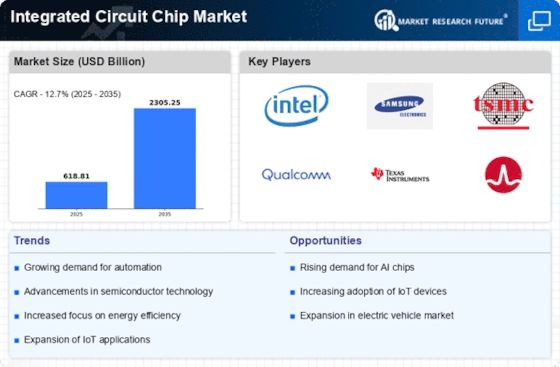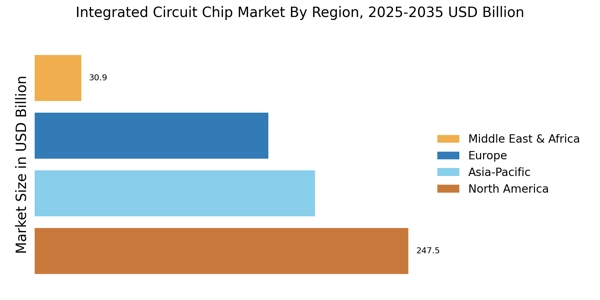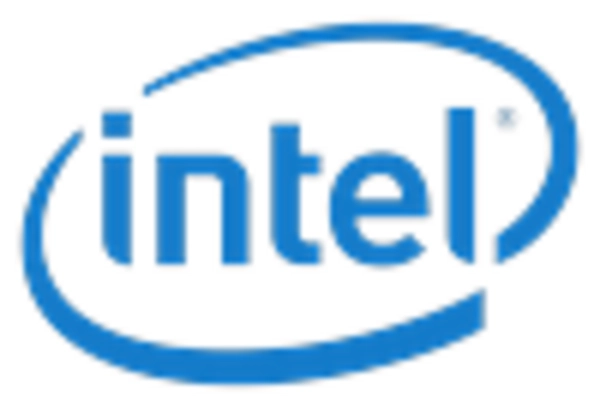Growing Demand for Data Centers
The Integrated Circuit Chip Market is experiencing growth due to the increasing demand for data centers, driven by the proliferation of cloud computing and big data analytics. In 2025, the data center sector is expected to account for a substantial share of the integrated circuit market, as organizations seek to enhance their data processing capabilities. The need for high-performance chips is critical for managing vast amounts of data efficiently and securely. As businesses continue to migrate to cloud-based solutions, the reliance on advanced integrated circuits becomes more pronounced. This trend not only supports the operational needs of data centers but also drives innovation in chip design and manufacturing. Thus, the growing demand for data centers is a key factor propelling the IC Chip Market.
Surge in Consumer Electronics Demand
The Integrated Circuit Chip Market experiences a notable surge in demand driven by the increasing consumption of consumer electronics. As households adopt smart devices, the need for advanced integrated circuits becomes paramount. In 2025, the consumer electronics sector is projected to account for approximately 30% of the total integrated circuit market. This trend is fueled by innovations in smartphones, tablets, and smart home devices, which require sophisticated chips for enhanced functionality. The proliferation of Internet of Things (IoT) devices further amplifies this demand, as these devices rely heavily on integrated circuits for connectivity and processing capabilities. Consequently, manufacturers are compelled to innovate and produce high-performance chips to meet the evolving needs of consumers, thereby propelling growth within the Integrated Circuit Chip Industry.
Advancements in Automotive Technology
The Integrated Circuit Chip Market is significantly influenced by advancements in automotive technology, particularly with the rise of electric and autonomous vehicles. In 2025, it is estimated that the automotive sector will represent around 25% of the integrated circuit market. The integration of sophisticated chips is essential for various automotive applications, including advanced driver-assistance systems (ADAS), infotainment systems, and electric powertrains. As automakers increasingly adopt smart technologies, the demand for high-performance integrated circuits is expected to escalate. This shift not only enhances vehicle safety and efficiency but also aligns with the broader trend of digital transformation in the automotive industry. Thus, the evolution of automotive technology serves as a critical driver for growth in the Integrated Circuit Chip Industry.
Expansion of Telecommunications Infrastructure
The Integrated Circuit Chip Market is poised for growth due to the expansion of telecommunications infrastructure, particularly with the rollout of 5G technology. As telecommunications companies invest heavily in upgrading their networks, the demand for integrated circuits that support high-speed data transmission is expected to rise. In 2025, the telecommunications sector is projected to account for approximately 20% of the integrated circuit market. The implementation of 5G networks necessitates advanced chips capable of handling increased data loads and providing low-latency communication. This technological evolution not only enhances connectivity but also drives innovation in various sectors, including healthcare, entertainment, and smart cities. Therefore, the expansion of telecommunications infrastructure is a pivotal factor influencing the growth trajectory of the IC Chip Industry.
Increased Investment in Research and Development
The Integrated Circuit Chip Market benefits from increased investment in research and development (R&D) across various sectors. Companies are allocating substantial resources to innovate and develop next-generation integrated circuits that meet the demands of emerging technologies. In 2025, R&D spending in the semiconductor industry is projected to reach unprecedented levels, reflecting a commitment to enhancing chip performance and efficiency. This investment is crucial for addressing challenges such as miniaturization, power consumption, and heat dissipation. As industries strive for technological advancement, the emphasis on R&D fosters a competitive landscape, driving the evolution of integrated circuits. Consequently, the focus on innovation and development serves as a significant driver for the growth of the Integrated Circuit Chip Industry.















